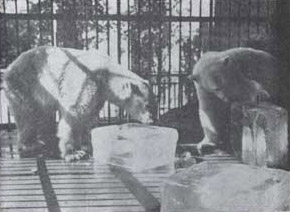|
HOME |
|
|
HOME |
|
The 'Five Freedoms' provide a useful way to evaluate animal welfare in a wide variety of situations. It says what the animals should have as their basic rights.
The 'Five Freedoms' are :
Freedom from thirst, hunger and malnutrition through ready access to fresh water and a diet to keep them healthy.
This is a basic need of all animals in captivity that should involve consideration of the type of food provided, the frequency and method of presentation, as well as its nutritive quality. The provision of both food and water should take into account the animals' species-specific requirements.
Freedom from thermal and physical discomfort by providing an appropriate environment including shelter and a comfortable resting area.
|
Addressing this freedom requires consideration of several factors including, but not limited to, shelter from inclement weather conditions (i.e., rain, snow, wind); the provision of cool, shady areas and warm, sunny areas as needed; the provision of ground of appropriate type and depth for animals that dig or burrow; the provision of trees, climbing apparatus and other materials that allow utilization of vertical space for animals that climb or fly. |

In hot climates, it is cruel to keep animals like polar bears. |
Freedom from pain, injury and disease by prevention or rapid diagnosis and treatment.

Factors to consider in addressing this freedom include
enclosure design;
the provision of suitable furnishings;
adequate space and appropriate social groupings to prevent inter-animal conflict,
and appropriate sanitation, diet, and veterinary care to prevent or treat injury and disease.
|
Freedom to express normal behaviour by providing sufficient space, proper facilities and company of the animal's own kind.
This fourth 'freedom' is integral to the health and well-being of captive wild animals, as well as for achieving the goals of zoos, wildlife parks and other facilities. All captive animals must be able to engage in a significant portion of their natural behavioural regimes. They should be given an opportunity for choice and control, thereby allowing them to make a meaningful contribution to the quality of their own lives. |
|
|
|
Freedom from fear and distress by ensuring conditions and treatment that avoid mental suffering. This 'freedom' includes not only fear and distress caused by physical injury or intimidation from conspecifics due to overcrowding or abnormal social groupings, but also to threats from outside predators and pests. Frustration and boredom must also be addressed, as well as other kinds of chronic stressors, such as problematic auditory, olfactory and visual stimuli. |